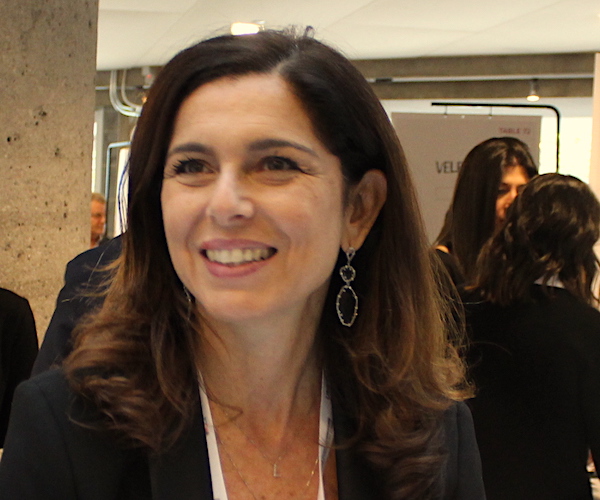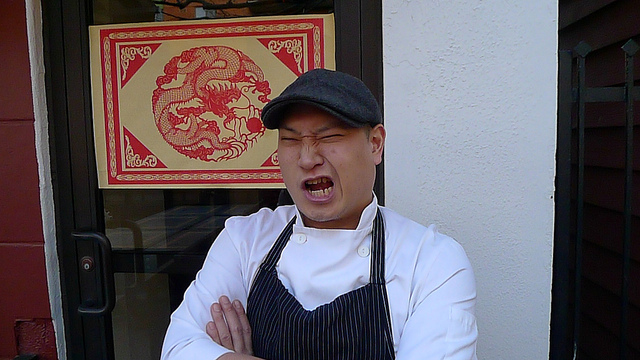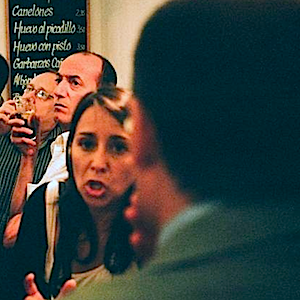Malcolm Jolley talks to the Executive Director of Community Food Centres Canada.
On October 18th over three dozen Toronto restaurants are participating in this year’s Restaurants for Change campaign to raise money for Community Food Centres Canada, the NGO begun five years ago by Nick Saul. Those restaurants, along with dozens of other restaurants across Canada, from Vancouver to St. John’s, have agreed to donate their food sales to help fund and raise awareness about CFCC’s pioneering work in low income neighbourhoods. A week before that, on October 11 in Toronto, Saul and the CFCC are hosting an evening event with the American food writer and journalist Mark Bittman called The Pleasure and Politics of Food.
The title of the October 11 event, which features a Q&A session between Bittman and Globe & Mail journalist Ann Hui, evokes much of the character of Nick Saul’s work, of how he transformed a food bank into a ‘community food centre’ at The Stop, built its Green Barn at Wychwood Park and went onto spread the community food centre model across the country. I was curious as to how that work was going, so I caught up with Nick Saul, who I consider a friend, this week to catch-up with him and find out what he and the team at CFCC have been up to and what they’re planning going forward.
This interview has been edited for length, style and clarity.
Good Food Revolution: Let’s talk about Restaurants for Change first, and then I’d like to catch-up on what you’re up to at CFCC. Does that work?
Nick Saul: Sure. I think this is our fourth year of Restaurants for Change and it’s progressing nicely, raising more funds for our work and also involving more and more restaurants around the country, which is terrific. You know these things are a slow, and you hope steady, rise. As you know, Malcolm, the proceeds from the dinners on October 18th go to support our brand range of programming that we run in low income communities across Canada. And within the group of restaurants participating in Restaurants for Change we have a number of ‘Chef Ambassadors’ who are really the galvanizers in their community. There’s Blair Lebsack from RGE RD in Edmonton, David Gunawan at Farmer’s Apprentice in Vancouver, Ben Kramer in Winnipeg, Renée Lavellée at The Canteen in Dartmouth, and so it goes on. These are the folks who are going to be on television, talking Restaurants for Change up through our partnership with Global TV. We have a number of goals for the event, and one of them is to strengthen our connection with the chef community across the country and get them understanding what we’re doing as an organization. Chefs are some of the most generous people you’ll ever want to meet in this world and certainly among the hardest working. So we want to get them talking about how food, and the way it’s produced in the world is connected to public health, the environment and climate change, and equity and justice is really important from our point of view. Chefs have important platforms and we want to embolden them to speak out, in whatever fora they have, about food system change.
Good Food Revolution: I guess there’s a pretty good communications opportunity for CFCC in those restaurants on October 18th, whether someone walks in the door knowing it’s the night of Restaurants for Change or not?
Nick Saul: Yeah. Whether the come intentionally, which is increasingly the case, or not, when they walk through the door they’ll bump into someone wearing a T-shirt that says ‘Healthy Food Is a Basic Human Right’. There will be a table talker that, I hope, gets them thinking about what we do, and maybe they’ll go to our website and say, ‘Wow, I’m interested in food and want to get involved.’ We’re looking for people who are ‘food forward’, as it were, who are thinking consciously about food from a pleasure and politics perspective. Those are our natural allies and supporters. And the more we can make the link between environmental issues and justice issues the better. Our work is firmly planted in going into low income communities and building beautiful, generous, respectful spaces where people can walk in and eat the best food they’ve ever eaten in their lives. And from there they can get involved in a perinatal health program, or a community kitchen for Spanish speakers, or learn how to grow things through our community garden initiatives, or get involved in a campaign that’s about trying to raise social assistance rates, or just come in and and sit to eat and feel less isolated and learn that, as a Senior you’re entitled to more income throughout the Guaranteed Income Supplement. Whatever it might be. I think it’s really vital in these finger pointing times to create spaces where people can come together, fell less lonely and know that they belong to something and get help to move their lives in a better direction. We happen to be able to do that through really good, healthy food.
Good Food Revolution: It’s a powerful message.
Nick Saul: We are always looking for people who will wander into our work and say, ‘That’s really powerful, I want to part of it’. That could be a diner at Restaurants for Change, but ultimately we want people to be engaged in our work over the long run. Community Food Centres Canada is really fundamentally about changing the way we think about food and what it means to eat it, how it’s produced, what it’s doing to our land, the workers who work on that land, our climate, and our bodies. Those are all fundamentally important questions right now, and food gets you into those conversations.
Good Food Revolution: I think you just gave me a pretty good set-up for a question about this event you’ve got with Mark Bittman on October 11.
Nick Saul: Mark is here for three days, in fact, doing events with us. Most of them are behind the scenes, but we’re doing the one public event on October 11, and I love the title: The Pleasure and Politics of Food. If anybody embodies that spirit of loving food and being interested in food from every angle it’s Mark. I’ve known Mark for a long time and Mark is a really propositional kind of person. He’s trying to encourage people to eat more of one thing and less of another: more whole grains and veggies, and less junk food, refined carbohydrates and meat. But he does it in a very, I think, inclusive way. He says that if you make these small changes, you can have a radical impact in aggregate on our planetary health and our physical health; if we all do this.
Good Food Revolution: My wife is a big fan of his Vegan Before Six program.
Nick Saul: Right. So he’s not saying don’t ever eat meat, but he is saying we ought to think what our consumption of meat is doing to us. His writing, before at the New York Times and now at Grub Street is about giving practical ways that people can view food in relationship to these big, seemingly intractable, problems of our time. It can seem to be paralyzing, but he shows that you can have agency in trying to turn these things around. It was [Michael] Pollan who coined the term ‘vote with your fork’, but Mark has this nice way of extending that by saying ‘vote with your fork, but vote with your vote as well’. So, you have a roll to play in terms of the choices of what ends up on your plate. He’s always encouraged people to get into the kitchen and cook, and I think that’s always been a pathway to being way more conscious about food and the impact it has, not just in your own house hold but around the world. So, Mark Bittman is always offering up ways for people to move to improve their world. I think that’s really important. If you come at these issues from a black and white perspective, I think you shut out a lot of important conversations. Mark is a real champion of being articulate about what the real issues are in a way that we can all understand them. His writing is tough and hard hitting and speaks to truth to power, but it always finds a way to let you in so you feel like you can do something about it.
Good Food Revolution: All of this activity is swirling around this organization you started five years ago called Community Food Centres Canada. What going on with you and the CFCC these days?
Nick Saul: In our first five years we’ve established ourselves as a legitimate national voice around food and justice, food and health. That’s a big achievement in my books: a lot of people have put a whole lot of work in solidifying our approach and what we’re on about. We have now eight community food centres across Canada, including the original one at The Stop. We work with about 120 other ‘Good Food Organizations’ in 56 towns and cities. These are organizations that our inspired by the model of a community food centre and we work with them through an national conference, through grants, through learning webinars and manuals that help transform a food bank into a force for change. We discuss how to set up a community kitchen…
Good Food Revolution: It’s an impressive and long list list of organizations – I was looking at the CFCC website earlier. You’re reaching across the country.
Nick Saul: If you go to our Food Summit, which happens in April or May, you can feel the energy in the room from people from coast to coast to coast, who are really doing terrific work in their communities. Or maybe they want to begin to go in another direction and they’re finding friends, and mentors, and oxygen, and resources from us to move ahead. It raises the hair on my arms! It’s really impressive to see that, and then know that they’ll go back and o impressive stuff. We’re creating spaces that are, going back to the beginning of our conversation, respectful. Spaces that foreground health, that foreground low income voices on what needs to change to make things better. Change is not going to happen overnight. With the full on Community Food Centres we work with, we can accelerate them through an injection of funds and resources. But it’s been really amazing to see the Good Food Organizations be part of a new conversation about food in low income communities and we’re trying to backstop that as much as possible.
Before we spoke, I was on the phone to some folks who had been to see The Alex Community Food Centre in Calgary. If you’re ever in Calgary, go see it. It’s a beautiful, phenomenal site on International Avenue. We flipped an old White Spot restaurant into a community food centre and it’s a great testimony to the concept with a beautiful space, adequate staff and programming resources, it leverages all sorts of volunteers, it meets the needs that were articulated by the community around growing, cooking, sharing and advocating, and, you know what, it just totally disrupts the way we’ve been doing this stuff for the last 30 or 40 years. We’re on a new way, on a new path. We’re not about measuring pounds of food, or numbers in line, it’s about home cook meals, friends made, food health outcomes, politicians visited; these are the things that we’re driving at. So, it’s pretty special to have had an idea with a bunch of other people to say, ‘We’ve got something here at the Stop that we can scale and take it other communities, and watch it grow and watch it find its own legs in a way that is true to that community, so it can make change in that community.’ And we’ve seen it happen in Calgary, and in Winnipeg, Dartmouth, Hamilton, Perth, Stratford, Regent Park and, of course the original Community Food Centre, The Stop. So, that’s what we’ve been able to accomplish in five years, and it’s terrific.
Good Food Revolution: And what’s next?
Nick Saul: It won’t surprise you to learn that we have a really ambitious plan for the next five years. We’re going to build 12 more Community Food Centres. We’re going to really focus on how we can adapt either the model of the community food centre or the programs of the community centre into the Indigenous experience by working with First Nations, Métis and Inuit communities. We want to see how we can adapt our work to their landscape, their context. We’re going to increase the number of grants we’re giving out to the Good Food Organizations and strengthen the knowledge sharing that we’ve been engaged in. We’re going to go out on a very ambitious fundraising campaign that will energize all of this work that I’m describing and encourage even more Canadians into the tent. We want to be better known and our next phase is about being the national leadership on these issues, whether that’s in the House of Commons or across the country. We want to be organization that is known for meeting people where they are at and helping them in the most dignified way, but also the organization that addresses the larger structural issues that cause vulnerability in communities and are driving chronic disease and have an impact on our climate. We want to be an organization that is known for being thoughtful about what we’re seeing on the front lines and surfacing them for a broader conversation. It’s about a broader conversation and people seeing us as creating the opportunity to grapple with big issues and ultimately be part and parcel of new solutions.
Good Food Revolution: What does that work look like?
Nick Saul: The first five years of the CFCC have been about building as many positive experiences as possible across the country for good food work. We’ll continue to strengthen that and make the case that an investment in food can change lives, change communities and change society. In the next five years, we’ll continue to do that and try to be evermore thoughtful, and bring evermore resources to bear on the advocacy work that we’re doing. Right now we have a national food policy that the federal government is trying to figure out. We want to be at the centre of that conversation. The government is also taking about a poverty reduction strategy. We want to be at the centre of that conversation. There is another government conversation going on about a new Canada Food Guide. We want to be at the centre of that conversation. We want a stop to the marketing to kids of fast food and sweet beverages. There’s talk about a sugar tax. Funds from a sugar tax could go towards a whole array of programming around health promotion. We’re looking at a national initiative that would look towards subsidizing fruits and vegetables in low income communities to ensure those communities have access to the best foods possible. So, we want to be pushing. Yes, pushing at government but also, maybe more importantly, out into the Canadian public. We know that to have influence in the corridors of Ottawa we need citizens to be aware of these issues, be able to articulate them and bring heat to the people in power. And all of our campaigns to the Canadian public will be very much grounded in our experiences with the Community Food Centres and the Good Food Organizations. That’s where we’ll be hearing the stories. Those space at their best are reflection of where we need to go as a society. They are about these words that I have said a lot over the last few years: dignity, health, generosity, pleasure, joy, equity, sustainability. Those are the things that are the DNA of the community food centre model. We’re just trying to find a way to explode that model so it’s writ large. I am convinced that if we can rethink food, we can change the world.








